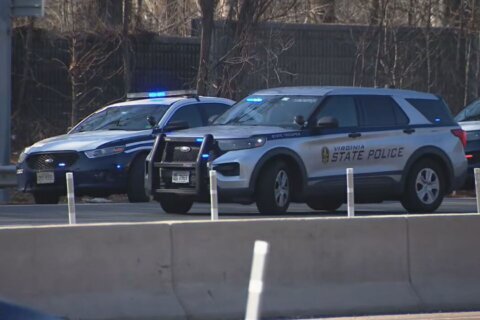For the first time, the U.S. Park Police officers who shot and killed motorist Bijan Ghaisar during a November 2017 traffic stop have said why they pulled the trigger — it was in self-defense.
In his initial substantive answer to the civil suit filed Wednesday by Ghaisar’s family in federal court in Alexandria, officer Lucas Vinyard’s attorney Stuart Sears said Ghaisar was shot “as the result of his own intentional, illegal, and/or otherwise wrongful conduct.”
Thursday, lawyers John Hundley and Kobie Flowers filed a largely similar answer for officer Alejandro Amaya.
In its suit, Ghaisar’s family said he was unarmed.
Vinyard and Amaya followed Ghaisar’s Jeep down the George Washington Parkway on Nov. 17, 2017. Ghaisar had been rear-ended in a fender-bender in Old Town Alexandria and had left the scene.
Dash cam video released by the Fairfax County Police Department showed that as the Park Police followed Ghaisar, he stopped his Jeep twice, but drove away twice, as officers pointed their guns at him.
After the third stop, at a stop sign in the Fort Hunt neighborhood in Fairfax County, Vinyard and Amaya approached Ghaisar’s vehicle, with guns drawn.
The video shows when Ghaisar’s Jeep moved forward, officers fired nine times. According to the family’s lawsuit, he was struck four times in the head, and once in his right wrist.
In their point-by-point responses to the March 29 amended complaint, which named Vinyard and Amaya as the officers involved the Ghaisar incident, the officers invoked their Fifth Amendment right to not incriminate themselves several times.
In addition, each of the attorneys said their client “lacks sufficient information to admit or deny the allegations,” to statements including, “Amaya and Vinyard were within close range of Bijan as he sat unarmed behind the wheel of his Jeep, when they fired nine shots into his vehicle.”
However, in several cases, the officers’ attorneys denied the family’s statements that there was no threat to Amaya or Vinyard while they fired, and that there was no basis to believe the officers reasonably perceived imminent danger or death.
The filings by Vinyard and Amaya came shortly before the deadline imposed by Magistrate Judge Ivan Davis, who granted the officers a 20-day extension to file their answers to the Ghaisar family’s complaint.
The FBI conducted an investigation and turned its findings over to the U.S. Attorney’s Office for the District of Columbia, and the Civil Rights Division of the Justice Department, to determine whether the officers should be charged. The possible prosecution was transferred from Virginia to D.C. to avoid a conflict of interest.
During a June 7 hearing, Flowers, one of Amaya’s attorneys, told Davis he had been in discussions with government prosecutors, and was confident the criminal investigation would be “resolved” within 20 days. Flowers did not specify in court how he expected the case to be resolved, although the mentioned the possibility the Justice Department might intervene to defend the officers in the civil suit — which would only be possible if the officers were cleared of criminal wrongdoing.
The officers’ attorneys declined to elaborate on their discussions with government prosecutors after several WTOP emails.
Contacted on June 7, Kadia Koroma, spokeswoman for D.C.’s U.S. Attorney’s Office, gave “no comment” when asked whether the investigation would be wrapped up within three weeks. After Vinyard and Amaya’s recent filings, Koroma said there were no updates.
Immediately after the June 7 hearing, Thomas Connolly, who is representing the Ghaisar family in the civil suit, was outraged to hear the government had been communicating with the officers’ lawyers, but not keeping the family in the loop.
“I’ve never seen more hostility from prosecutorial authorities toward a family,” Connolly told reporters. The Ghaisar family has not filed any documents reacting to the officers’ statements that they fired in self-defense.








